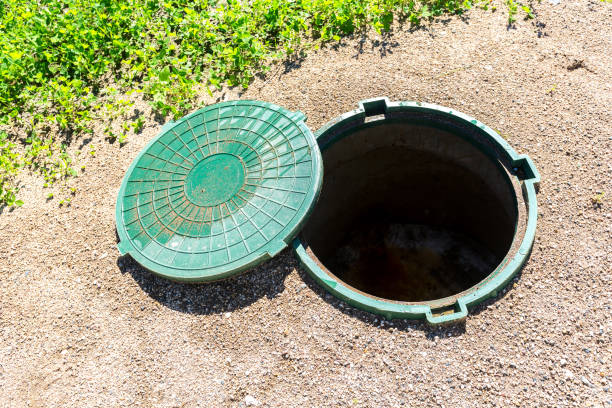We all want our homes to smell fresh, right? A well-working septic system is a big part of that. But let’s face it—septic system smells can be a real headache. Those bad smells caused by what’s going on in the system can turn your cozy home into an unpleasant place.
Most often, these odors come from things like not maintaining your system well enough, having too much waste, or some issues within the system itself. The key isn’t just masking the smell with air fresheners or candles; it’s about getting to the root cause.
Whether you’ve just caught a whiff or it’s a persistent problem, taking proactive steps can work wonders. Below, we’ll guide you through practical tips to help you regain control and eliminate those pesky septic system odors.
Should Septic Tanks Smell?
Ideally, septic tanks shouldn’t give off any bad smells. But if you start smelling something unpleasant in your bathroom or kitchen, a problem needs fixing.
Understanding the Causes of Septic System Odour
Bad smells coming from your septic system can make your home less enjoyable. But before we fix it, let’s understand why these odors happen. Septic system smells can come from a few things, like:
- Excessive Waste: When a septic system is overwhelmed with more waste than it can handle, it can start to give off offensive odours. This overload can occur due to a higher-than-usual volume of water or waste being flushed into the system. It might also happen when the system is undersized for the household’s needs.
- Lack of Maintenance: Regular maintenance is crucial for a healthy septic system. When maintenance tasks such as pumping, inspecting, and cleaning are neglected, it can lead to a buildup of sludge and scum. This buildup causes the system to become less efficient in breaking down waste, resulting in odors.
- Blockages or Clogs: Blockages in the pipes or the septic tank itself can impede the proper flow of waste. This obstruction can cause backups and create a conducive environment for odor-causing bacteria to thrive, leading to foul smells.
- Faulty Septic System Design: In some cases, poor initial design or installation of the septic system can contribute to odor issues. Improperly positioned vents or inadequate tank size relative to household needs may lead to ventilation problems or overload, causing odors to escape.
- Leakage within your septic system: if your septic system develops leaks or cracks, odors might escape into your yard or even inside your home. These leaks allow the smelly gases produced in the system to seep out, causing unpleasant odors to linger in your surroundings.
Effective Way of Getting Rid of Septic Odors
-
Regular Maintenance and Pumping:
Regular maintenance is one of the most important things in keeping septic system odors at bay. Sticking to a schedule for inspections and following the recommended pumping routine for your septic tank is essential.
Usually, tanks need to be pumped every 3-5 years, but this might differ based on how many people are in your household and how much water you use. Pumping it out on schedule helps stop solid waste from piling up, keeping the system running smoothly and reducing the chances of odors creeping up.
-
Check for Cracks and Leaks
Make it a habit to check your septic system for leaks or cracks regularly. Look for signs like wet spots in your yard or where water accumulates. If you notice any of these issues, addressing them promptly is important.
-
Repair Blocked Drains and Pipes
Ensuring you promptly address any clogged drains or pipes is key to preventing sewage backup and unwanted smells in your home. Also, sticking to the Do-Not-Flush Rules, like avoiding “flushable” wipes or anything not meant for flushing, will keep your septic system running smoothly and your house smelling fresh.
-
Good Ventilation
Ensuring your home has good ventilation is essential in minimizing septic system odors. Having proper ventilation helps prevent the buildup of unpleasant gases inside your house. Keep windows open whenever you can, use exhaust fans in bathrooms and kitchens, and think about adding air vents or cleaners to keep the indoor air fresh.
-
Use Bacterial Additives
Consider using septic-safe bacterial additives to enhance the natural breakdown of waste in your septic tank. These additives help foster a balanced bacterial environment, aiding in the decomposition of solids and minimizing odors.
However, select products specifically designed for septic systems and follow recommended usage guidelines to achieve optimal results.
-
Make Use of an Odour Filter
Managing waste often means dealing with less-than-pleasant smells, but installing odor filters can make a big difference in handling septic system odors. These filters are usually placed in the septic vent pipes and work by trapping and neutralizing foul gases before they escape into the air.
They act as a barrier, stopping bad smells from spreading around your property. If you’re still facing persistent odors despite other efforts, these filters can be an extra step to consider.
-
Consult a Professional
If you’re still facing persistent odors even after trying the above solutions, it might be time to reach out to a certified septic system professional. These experts have the expertise to perform detailed inspections, pinpoint the root cause of the issue, and suggest customized solutions to address the problem effectively.
Conclusion
Dealing with septic system odors can disrupt the comfort of your home. But don’t worry! By following these simple recommendations, you can keep your home free from those unpleasant smells. Take care of your septic system, and you’ll have a clean, fresh-smelling home.
Are you having any septic system issues or need reliable repairs? Contact VI Reel Septic & Excavation! Our team of experts is here to resolve any problem and maintain your septic functionality. Reach out today for assistance.


